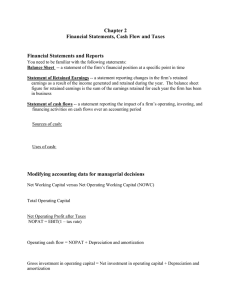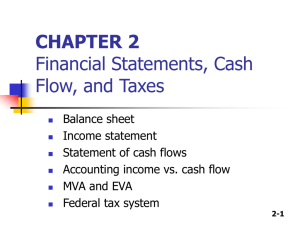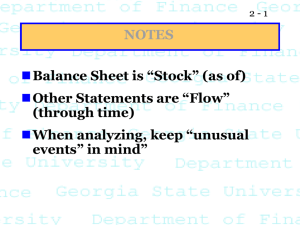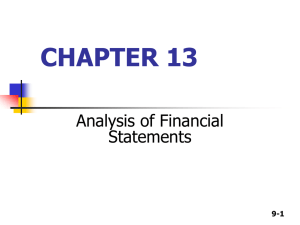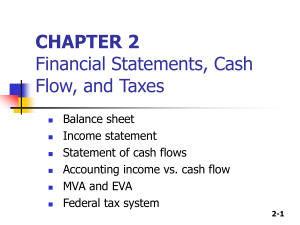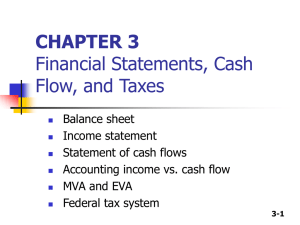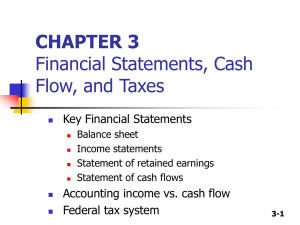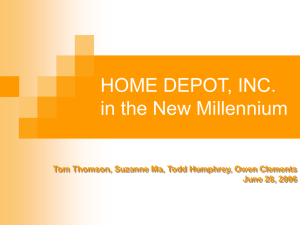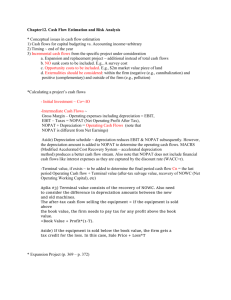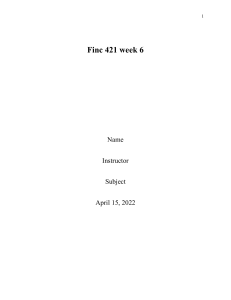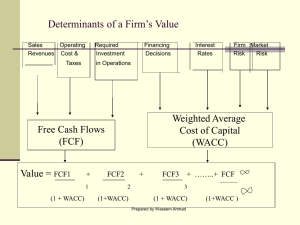CHAPTER 2 Financial Statements, Cash Flow, and Taxes
advertisement
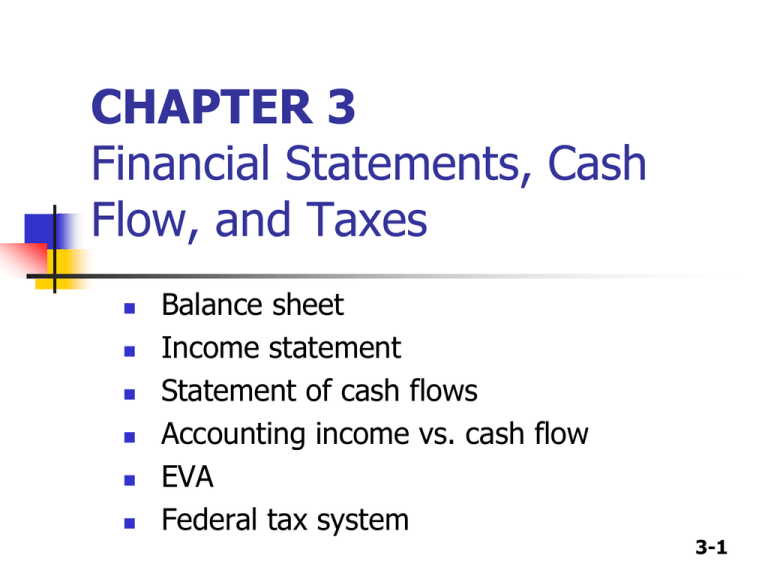
CHAPTER 3 Financial Statements, Cash Flow, and Taxes Balance sheet Income statement Statement of cash flows Accounting income vs. cash flow EVA Federal tax system 3-1 Tutor hours FIN 350 (BUS 137) Mon. 5:00 - 7:00pm Wed. 12:00 - 2:00pm & 5:00 - 7:00pm Thurs. 11:00 - 1:00pm 3-2 The Annual Report– a review of acct 101 Balance sheet – provides a snapshot of a firm’s financial position at one point in time. Income statement – summarizes a firm’s revenues and expenses over a given period of time. Statement of retained earnings – shows how much of the firm’s earnings were retained, rather than paid out as dividends. Statement of cash flows – reports the impact of a firm’s activities on cash flows over a given period of time. 3-3 Balance Sheet: Assets Cash A/R Inventories Total CA Gross FA Less: Dep. Net FA Total Assets 2002 7,282 632,160 1,287,360 1,926,802 1,202,950 263,160 939,790 2,866,592 2001 57,600 351,200 715,200 1,124,000 491,000 146,200 344,800 1,468,800 3-4 Balance sheet: Liabilities and Equity 2002 Accts payable 524,160 Notes payable 636,808 Accruals 489,600 Total CL 1,650,568 Long-term debt 723,432 Common stock 460,000 Retained earnings 32,592 Total Equity 492,592 Total L & E 2,866,592 2001 145,600 200,000 136,000 481,600 323,432 460,000 203,768 663,768 1,468,800 3-5 Income statement Sales COGS Other expenses EBITDA Depr. & Amort. EBIT Interest Exp. EBT Taxes Net income 2002 6,034,000 5,528,000 519,988 (13,988) 116,960 (130,948) 136,012 (266,960) (106,784) (160,176) 2001 3,432,000 2,864,000 358,672 209,328 18,900 190,428 43,828 146,600 58,640 87,960 3-6 Other data No. of shares EPS DPS Stock price 2002 100,000 -$1.602 $0.11 $2.25 2001 100,000 $0.88 $0.22 $8.50 3-7 Statement of Retained Earnings (2002) Balance of retained $203,768 earnings, 12/31/01 Add: Net income, 2002 (160,176) (11,000) Less: Dividends paid Balance of retained $32,592 earnings, 12/31/02 3-8 Statement of Cash Flows (2002) OPERATING ACTIVITIES Net income Add (Sources of cash): Depreciation Increase in A/P Increase in accruals Subtract (Uses of cash): Increase in A/R Increase in inventories Net cash provided by ops. (160,176) 116,960 378,560 353,600 (280,960) (572,160) (164,176) 3-9 Statement of Cash Flows (2002) L-T INVESTING ACTIVITIES Investment in fixed assets (711,950) FINANCING ACTIVITIES Increase in notes payable Increase in long-term debt Payment of cash dividend Net cash from financing 436,808 400,000 (11,000) 825,808 NET CHANGE IN CASH (50,318) Plus: Cash at beginning of year Cash at end of year 57,600 7,282 3-10 What can you conclude about the company' financial condition from its statement of CFs? Net cash from operations = -$164,176, mainly because of negative NI. The firm borrowed $825,808 to meet its cash requirements. Even after borrowing, the cash account fell by $50,318. 3-11 How much is net operating after taxes (NOPAT)? NOPAT = EBIT (1 – Tax rate) NOPAT02 = -$130,948(1 – 0.4) = -$130,948(0.6) = -$78,569 NOPAT01 = $114,257 3-12 What effect did the expansion have on net operating working capital (NOWC)? Current - Non-interest NOWC = assets bearing CL Examples of Non-interest bearing current liability: account payable, unearned revenue, etc. Example of interest bearing current liability: note payable NOWC02 = ($7,282 + $632,160 + $1,287,360) – ( $524,160 + $489,600) = $913,042 NOWC01 = $842,400 3-13 Net fixed Assets Net fixed assets mean long term assets after depreciation and amortization At end of 2002 net fixed assets=$939,790 At the end of 2001 net fixed assets=$344,800 3-14 How much is the operating capital? Operating capital = NOWC + Net Fixed Assets Operating Capital02 = $913,042 + $939,790 = $1,852,832 Operating Capital01 =$842,400+$344,800 =1,187,200 3-15 What effect did the expansion have on operating cash flow (OCF)? OCF02 = NOPAT + Dep = ($78,569) + $116,960 = $38,391 OCF01 = $114,257 + $18,900 = $133,157 3-16 What is your assessment of the expansion’s effect on operations? Sales NOPAT NOWC Operating capital Net Income 2002 $6,034,000 -$78,569 $913,042 $1,852,832 -$160,176 2001 $3,432,000 $114,257 $842,400 $1,187,200 $87,960 3-17 What was the free cash flow (FCF) for 2002? FCF = Operating Cash Flow (OCF) – Gross capital investment - OR FCF = NOPAT – Net Investment (change) in Operating Capital = -$78,569 – ($1,852,832 - $1,187,200) = -$744,201 (year 2002) Remember: OCF=NOPAT+DEP, Gross Capital investment =Net Investment in Operating Capital + DEP Is negative free cash flow always a bad sign? 3-18 Economic Value Added (EVA) EVA = After-tax __ After-tax Operating Income Capital costs = NOPAT – After-tax Cost of Capital 3-19 EVA Concepts In order to generate positive EVA, a firm has to more than just make a profit. It must also provide a return to those who have provided the firm with capital. EVA takes into account the total cost of capital. 3-20 What is the firm’s EVA? Assume the firm’s after-tax percentage cost of capital was 10% in 2000 and 13% in 2001. EVA02 = = = = NOPAT – (After tax cost of capital) (Capital) -$78,569 – (0.13)($1,852,832) -$78,569 - $240,868 -$319,437 EVA01 = $114,257 – (0.10)($1,187,200) = $114,257 - $118,720 = -$4,463 3-21 Federal Income Tax System 3-23 Corporate and Personal Taxes Both have a progressive structure (the higher the income, the higher the marginal tax rate). Corporations Rates begin at 15% and rise to 35% for corporations with income over $10 million. Also subject to state tax (around 5%). In most problems, we will assume 40% Individuals Rates begin at 10% and rise to 35% for individuals with income over $319,100. May be subject to state tax. 3-24 Tax treatment of various uses and sources of funds Interest paid – tax deductible for corporations (paid out of pre-tax income), but usually not for individuals (interest on home loans being the exception). Dividends paid – not tax deductible. Dividends received – taxed as ordinary income for individuals (“double taxation”). Interest earned – usually fully taxable (an exception being interest from a “muni”). 3-25
